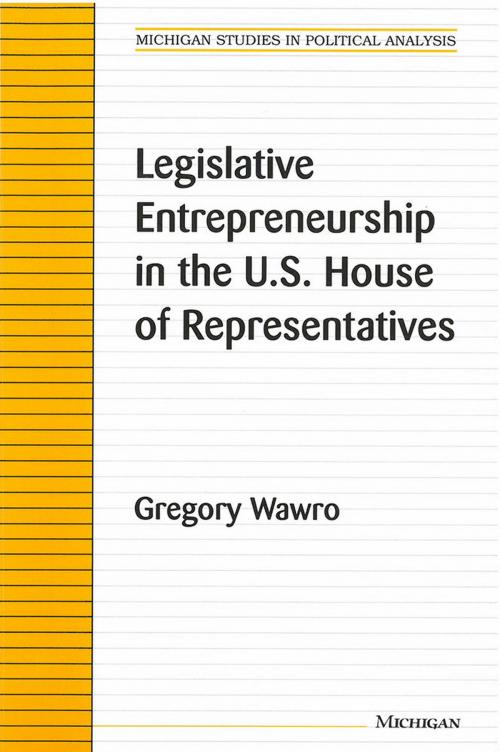Legislative Entrepreneurship in the U.S. House of Representatives
Nonfiction, Social & Cultural Studies, Political Science, Government| Author: | Gregory Wawro | ISBN: | 9780472022489 |
| Publisher: | University of Michigan Press | Publication: | September 23, 2010 |
| Imprint: | University of Michigan Press | Language: | English |
| Author: | Gregory Wawro |
| ISBN: | 9780472022489 |
| Publisher: | University of Michigan Press |
| Publication: | September 23, 2010 |
| Imprint: | University of Michigan Press |
| Language: | English |
When members are elected to the House of Representatives they have a certain freedom to decide how they will act as members and how they will build their reputations. Just as in the market place entrepreneurs build businesses, so in the House of Representatives members have the freedom to choose to build legislative programs that will enhance their reputations in the institution. And yet entrepreneurship is also costly to members. Gregory Wawro explains why members of the House engage in legislative entrepreneurship by examining what motivates them to acquire policy knowledge, draft legislation, build coalitions, and push their legislation in the House. He considers what incentives members have to perform what many have perceived to be the difficult and unrewarding tasks of legislating.
This book shows how becoming a legislative entrepreneur relates to members' goals of reelection, enacting good public policy, and obtaining influence in the House. The analysis differs from previous studies of this behavior, which for the most part have employed case study methods and have relied on anecdotal evidence to support their arguments. Wawro analyzes legislative entrepreneurship in a general and systematic fashion, developing hypotheses from rational-choice-based theories and testing these hypotheses using quantitative methods.
Wawro argues that members engage in legislative entrepreneurship in order to get ahead within the House. He finds that the more legislative entrepreneurship that members engage in, the more likely it is that they will advance to prestigious positions.
This book is of interest to students of Congress, legislative behavior and institutions, elections, and campaign finance.
Gregory Wawro is Assistant Professor of Political Science, Columbia University.
When members are elected to the House of Representatives they have a certain freedom to decide how they will act as members and how they will build their reputations. Just as in the market place entrepreneurs build businesses, so in the House of Representatives members have the freedom to choose to build legislative programs that will enhance their reputations in the institution. And yet entrepreneurship is also costly to members. Gregory Wawro explains why members of the House engage in legislative entrepreneurship by examining what motivates them to acquire policy knowledge, draft legislation, build coalitions, and push their legislation in the House. He considers what incentives members have to perform what many have perceived to be the difficult and unrewarding tasks of legislating.
This book shows how becoming a legislative entrepreneur relates to members' goals of reelection, enacting good public policy, and obtaining influence in the House. The analysis differs from previous studies of this behavior, which for the most part have employed case study methods and have relied on anecdotal evidence to support their arguments. Wawro analyzes legislative entrepreneurship in a general and systematic fashion, developing hypotheses from rational-choice-based theories and testing these hypotheses using quantitative methods.
Wawro argues that members engage in legislative entrepreneurship in order to get ahead within the House. He finds that the more legislative entrepreneurship that members engage in, the more likely it is that they will advance to prestigious positions.
This book is of interest to students of Congress, legislative behavior and institutions, elections, and campaign finance.
Gregory Wawro is Assistant Professor of Political Science, Columbia University.















